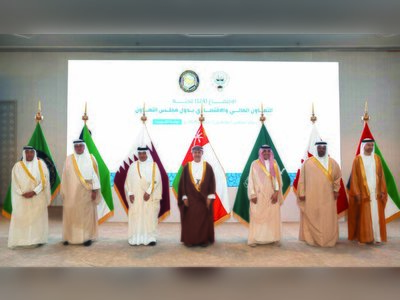
How Saudi Arabia safeguards online intellectual property
A comprehensive examination of Saudi Arabia's measures to protect digital identity theft and safeguard creative content.
RIYADH: As modern technology progresses, artificial intelligence (AI) becomes increasingly central to everyday life, revolutionizing how individuals interact with information and personal identity.
From generating images and powering live-streamed avatars like VTubers to aiding in data sourcing, AI is transforming creative industries.
However, this technological advancement brings risks — notably the growing threat of digital identity theft.
Without stringent safeguards, original ideas and personal likenesses can be reproduced, misused, or stolen without consent.
A CREATOR’S PERSPECTIVE
Saudi content creator and VTuber PikaLoli is well-acquainted with these challenges.
In an interview, she highlighted the necessity to protect her digital persona: "Since my character and brand exist only online, it’s really important for me to prevent others from copying or misusing my content," PikaLoli said.
She expounded on VTubing as a multifaceted role blending technology and creativity.
Despite appearing as an animated character, every part of her content is carefully crafted by her alone: "I produce gaming videos, roleplays, and short storytelling on YouTube, creating magical digital experiences.
Though I am a digital avatar, my work requires constant creativity and attention".
Since her channel’s inception in April 2021, PikaLoli has garnered over 1 million subscribers and aims to expand her online community further.
Despite leveraging AI for content creation, she remains cautious about its limitations: "I love how AI can assist with animation and ideas, but I don’t fully trust it to embody my identity.
It’s vital to remember that AI can’t substitute the authentic Pikaloli.
To me, AI serves more as a tool or assistant rather than an originator".
OPINION
This section contains relevant reference points, placed in (Opinion field)
To combat potential misuse, PikaLoli relies on her unique character attributes and the loyalty of her fans: "Even if someone attempts to replicate my work, I trust my community to recognize originality".
She also employs secure platforms, diligently monitors for content misuse, and maintains a close connection with her audience.
As she put it, "a robust community offers protection against impersonators as well".
A GLOBAL CHALLENGE
Identity theft issues extend beyond individual creators globally.
Millions fall victim to digital fraud each year.
In France alone, more than 200,000 individuals are affected annually, facing penalties of up to one year in prison and fines up to 15,000 euros ($16,300), as described by the IN Group website.
SAUDI ARABIA’S REGULATORY FRAMEWORK
In Saudi Arabia, the Saudi Authority for Intellectual Property (SAIP) plays a crucial role in preventing such crimes.
SAIP aims to regulate, support, develop, nurture, protect, enforce, and enhance intellectual property according to global best practices.
Executive Director Fahad Alzamil explains that both citizens and residents can register copyrights, trademarks, and patents online through the official SAIP website.
He also cites Article 17 of Saudi Arabia’s Copyright Law: "It prohibits the publication, display, or distribution of a photograph without the permission of the person depicted," applying to both traditional and AI-generated images or audiovisual works.
Alzamil emphasizes that this legal framework is designed to protect individuals from risks associated with digital manipulation.
DID YOU KNOW?
• In France, over 200,000 people are victims of identity theft annually, prompting strict regulatory measures.
• Article 17 of Saudi Arabia’s Copyright Law restricts the reproduction or distribution of a photograph without consent, inclusive of AI-generated content.
In addition to legal protections such as the Personal Data Protection Law and Anti-Cybercrime Law, SAIP offers comprehensive support services.
The authority uses advanced monitoring tools and awareness campaigns while collaborating with international bodies like the World Intellectual Property Organization to ensure global best practices are followed.
BALANCING INNOVATION AND SECURITY
AI brings about vast opportunities for innovation yet raises pressing concerns over identity protection.
For creators like PikaLoli, maintaining authenticity necessitates constant vigilance; regulators like SAIP need to build robust legal and digital safeguards.
Alzamil suggests that protecting digital identity is a matter of law, awareness, and collaboration — the future of creativity depends on trust, responsibility, and joint efforts to secure both identities and intellectual property in the digital sphere.
From generating images and powering live-streamed avatars like VTubers to aiding in data sourcing, AI is transforming creative industries.
However, this technological advancement brings risks — notably the growing threat of digital identity theft.
Without stringent safeguards, original ideas and personal likenesses can be reproduced, misused, or stolen without consent.
A CREATOR’S PERSPECTIVE
Saudi content creator and VTuber PikaLoli is well-acquainted with these challenges.
In an interview, she highlighted the necessity to protect her digital persona: "Since my character and brand exist only online, it’s really important for me to prevent others from copying or misusing my content," PikaLoli said.
She expounded on VTubing as a multifaceted role blending technology and creativity.
Despite appearing as an animated character, every part of her content is carefully crafted by her alone: "I produce gaming videos, roleplays, and short storytelling on YouTube, creating magical digital experiences.
Though I am a digital avatar, my work requires constant creativity and attention".
Since her channel’s inception in April 2021, PikaLoli has garnered over 1 million subscribers and aims to expand her online community further.
Despite leveraging AI for content creation, she remains cautious about its limitations: "I love how AI can assist with animation and ideas, but I don’t fully trust it to embody my identity.
It’s vital to remember that AI can’t substitute the authentic Pikaloli.
To me, AI serves more as a tool or assistant rather than an originator".
OPINION
This section contains relevant reference points, placed in (Opinion field)
To combat potential misuse, PikaLoli relies on her unique character attributes and the loyalty of her fans: "Even if someone attempts to replicate my work, I trust my community to recognize originality".
She also employs secure platforms, diligently monitors for content misuse, and maintains a close connection with her audience.
As she put it, "a robust community offers protection against impersonators as well".
A GLOBAL CHALLENGE
Identity theft issues extend beyond individual creators globally.
Millions fall victim to digital fraud each year.
In France alone, more than 200,000 individuals are affected annually, facing penalties of up to one year in prison and fines up to 15,000 euros ($16,300), as described by the IN Group website.
SAUDI ARABIA’S REGULATORY FRAMEWORK
In Saudi Arabia, the Saudi Authority for Intellectual Property (SAIP) plays a crucial role in preventing such crimes.
SAIP aims to regulate, support, develop, nurture, protect, enforce, and enhance intellectual property according to global best practices.
Executive Director Fahad Alzamil explains that both citizens and residents can register copyrights, trademarks, and patents online through the official SAIP website.
He also cites Article 17 of Saudi Arabia’s Copyright Law: "It prohibits the publication, display, or distribution of a photograph without the permission of the person depicted," applying to both traditional and AI-generated images or audiovisual works.
Alzamil emphasizes that this legal framework is designed to protect individuals from risks associated with digital manipulation.
DID YOU KNOW?
• In France, over 200,000 people are victims of identity theft annually, prompting strict regulatory measures.
• Article 17 of Saudi Arabia’s Copyright Law restricts the reproduction or distribution of a photograph without consent, inclusive of AI-generated content.
In addition to legal protections such as the Personal Data Protection Law and Anti-Cybercrime Law, SAIP offers comprehensive support services.
The authority uses advanced monitoring tools and awareness campaigns while collaborating with international bodies like the World Intellectual Property Organization to ensure global best practices are followed.
BALANCING INNOVATION AND SECURITY
AI brings about vast opportunities for innovation yet raises pressing concerns over identity protection.
For creators like PikaLoli, maintaining authenticity necessitates constant vigilance; regulators like SAIP need to build robust legal and digital safeguards.
Alzamil suggests that protecting digital identity is a matter of law, awareness, and collaboration — the future of creativity depends on trust, responsibility, and joint efforts to secure both identities and intellectual property in the digital sphere.










